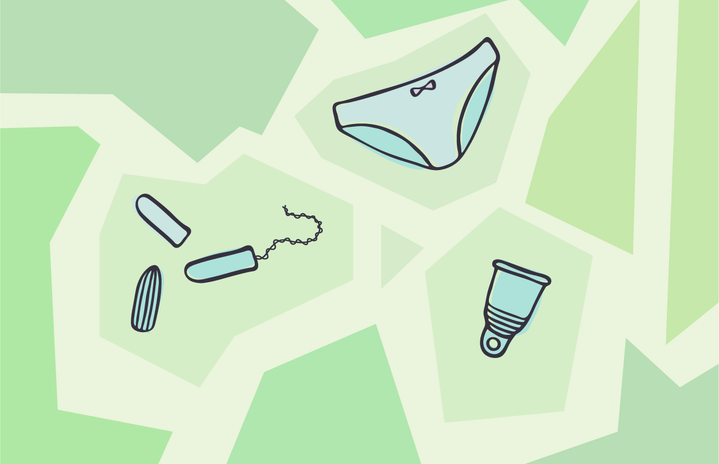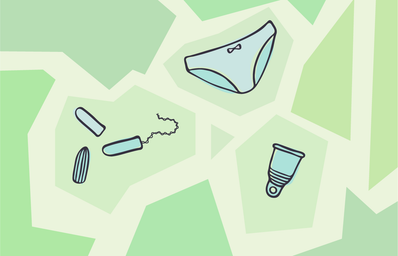You’re having sex and everything is going great, but suddenly there’s pain and you look over and you just bled all over your partner’s bed. It’s embarrassing and mortifying, and the worst part is you don’t know why, and you don’t know who to talk to about it. You don’t want to go to your doctor because it’s probably nothing, right? And you don’t want to talk to your parents about it because that’s even more horrifying. So, talk to friends, fellow young women that have most likely been through this before. But that’s not normalized. Women don’t feel comfortable talking about topics perceived as sensitive which, unfortunately for us, usually equates to women’s health issues – vaginal discharge, pain during sex, that random hookup you took home from that Midtown bar, orgasms. When we don’t talk about them you feel alone, as if you are the only person to ever bleed all over their partner’s bed. At least that’s how I felt when it happened to me. On the plus side, you are not alone in your vaginal bleeding bubble of embarrassment and pain.
I will act as your friend today and talk to you about vaginal bleeding, so you don’t feel quite so alone. And maybe you, dear reader, will feel a little more comfortable talking to your friends about it, and I can almost guarantee you that they will be more than grateful to spill their sexual health worries too.
Why is my vagina bleeding?
Fun fact, most vaginal bleeding doesn’t come from the vagina at all, it comes from your cervix. There are lots of factors that could be causing your bleeding. Most of them are not dangerous in the slightest and easily fixed or even solve themselves. For college-aged women, like you fine reader, most bleeding occurs during or after sex. According to the Mayo Clinic, if you start bleeding during your first sexual experience it’s most likely due to your hymen (a thin flap of skin covering a portion of your vaginal opening) tearing. If this is the case, don’t worry. Your bleeding will most likely stop shortly after but might continue for a couple of days and your next couple of sexual encounters.
If you’re not a virgin and you’re bleeding after or during sex it could be something simple, like a lack of lubrication which causes uncomfortable friction. The first thing to think about is if you started your period. I know it sounds unlikely, but if your bleeding starts around when you’re supposed to start menstruating or you have accompanying period symptoms that could be the cause. Or it could be indicative of something more serious.
According to the NHS, a sexually transmitted infection (STI), like chlamydia, could be the cause of your bleeding or even an issue with your birth control method. UF Health lists irregular usage of hormonal birth control (like skipping your pills) as a possible cause. As you can see, most of these are solvable and nothing to freak out about (*breath*). And the good news is these are all easily treatable and there are ample resources at UF to help you.
What do I do if my vagina is bleeding?
If you think the cause of your bleeding isn’t due to something abnormal, then there are things you can do at home to make sure you’re okay. UF Health urges that if your bleeding is very heavy or constant then contact your doctor or the UF Women’s Health Clinic. This clinic is a useful resource for women on campus for other issues too. They have lots of gynecological health services, like birth control, STI tests, pregnancy tests and other routine services for women.
A good way to see if your bleeding is easing is to count the number of pads or tampons you use over time and if that number slows down. According to the clinic, you should contact a medical professional if: “you are pregnant, there is any unexplained bleeding between periods, there is any heavy bleeding with periods” or if you have any accompanying symptoms like pelvic pain, fatigue or dizziness.
The most important thing to do in this situation is to not ignore your body. If you’re feeling pain or bleeding, with or without sex, your body is trying to tell you something is wrong. So, just listen to it.
Why aren’t we talking about this?
When things like this happen, it can feel incredibly isolating, like you and you alone have this issue and you’re a freak or a failure in bed (especially if your partner is making you feel bad about it, which if they are you need to have a conversation with them. But that’s another conversation). So why don’t we, as women, feel like we can talk about these issues with each other? Reproductive health problems are so common that if we as, young women and older women alike just combine our experiences and knowledge we would have a communal well of resources and dialogue to tap into. Why are these issues stigmatized? We shouldn’t feel embarrassed about what happens to our vaginas. It’s either completely natural or important enough to be seen by a doctor. Either way, it needs to be talked about.
In a study on young unmarried women to identify the stigma of utilizing reproductive health services, the participating women stated that “whenever they had shared the reproductive health-related problems with their families, no advice had been provided to them.” If a woman is having trouble talking to their own family about their reproductive health, then what makes them think they can talk to a friend about it?
So, to help you all out I am going to share my experience with vaginal bleeding with you all and hopefully, it will encourage you all to talk about it too.
I met this guy, who shall remain nameless, at a party. Things are going great, sparkling conversation, kind eyes, the whole gamete. I end up seeing him another couple of times through friend groups and coincidentally around Gainesville, so I decide, “hey, I like him let’s sleep together.” I hadn’t exactly had sex in a while, so I was prepared for a little pain, but it was worse than I was expecting. I was starting to get worried that what I was experiencing wasn’t normal, so I tell him to stop (which he did, and if your partner doesn’t that’s an issue). I roll over to see that I have soaked his sheets with my blood. I was so mortified and embarrassed, which I shouldn’t have been. It happens and I mean, hey, he did get to have sex with me. I even offered to buy him a new pair of sheets, I felt that bad.
I continued to bleed a bit in my sleep and my vagina was sore for a few days following. My bleeding lightened after a few hours and was gone after a couple of days. Because I was feeling better, but probably against my better judgment, I decided to have sex with him again. And, again, I bleed and, again, he had to wash his sheets. But the second time it wasn’t as bad. The pain wasn’t as severe, and the bleeding was lighter and stopped shortly after.
Luckily for me, I have a best friend I can talk to about topics like vaginal bleeding and from her experience, I reasoned that I was fine and just stretching a bit. But, in hindsight, I probably should have gone to see a gynecologist (don’t worry, I’m fine) but because I had an open space to talk about women’s health, wasn’t stigmatized. That’s my hope for all of you.


